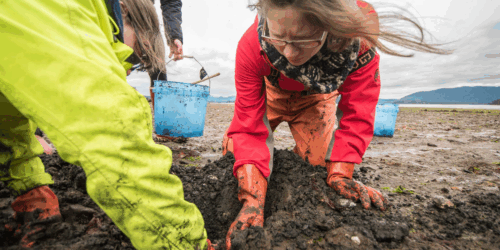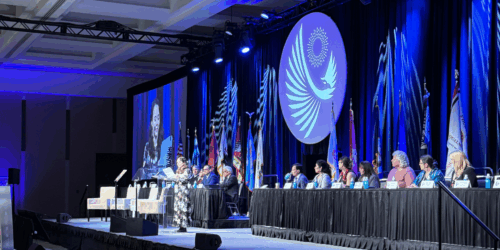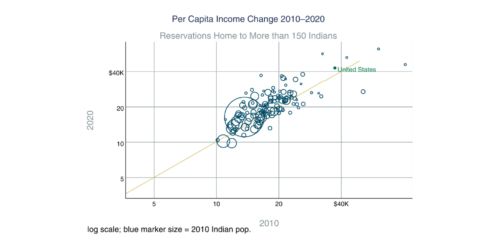Seattle, WA – Honoring Nations, a prestigious national awards program dedicated to uplifting stories of success from tribal governments, announces the awardees of the 2025 Honoring Nations Awards. Six exemplary governmental initiatives were recognized for outstanding excellence in governance at the National Congress for American Indians’ (NCAI) 82nd Convention in Seattle, WA. The Honoring Nations Awards honor the best examples of tribal self-governance from across Indian Country. This year’s awardees include: College of Osteopathic Medicine at the Cherokee Nation, Inter-Tribal Co-Management of Bears Ears, Iron Horse Industrial Park, Jicarilla Apache Nation’s Water Sharing Agreement, Sche’lang’en Village Transformational Wrap-Around Program, and Taos Pueblo Priority Process.
The Honoring Nations Board of Governors presented the awards today, November 20th, in front of thousands of leaders and policy makers working throughout Indian Country. Addressing critical issues, the 2025 Honoring Nations award recipients provided NCAI attendees with brief presentations, documenting what is working in Indian Country and how each program is strengthening its nation. Regis Pecos (Cochiti), Honoring Nations Board of Governors Chairman shared, “Thank you for blessing us with your continued work. Like all generations before us, you continue to do what is necessary to be the protectors, to be the guardians, to be the stewards. In the same way our forefathers rose to each challenge, you are doing the same. And for that we are grateful and we are appreciative of your hard work, vision, and wisdom.”
The 2025 Honoring Nations award cycle received over 100 applications from 76 tribal nations and seven tribal consortia, making it one of the most competitive years to date. Evaluated by the Honoring Nations Board of Governors, three “High Honors” and three “Honors” recipients were identified for their significance to sovereignty, immense effectiveness, cultural relevance, transferability, and sustainability.
These six honorees join a distinguished alumni group of 142 past awardees. This year, their stories of strengthening tribal governance include special lessons on sustainable land stewardship and management, health provider training, economic development and free trade zones, culturally grounded wrap-around services, participatory self-determination, and water security. Each of the awardees receives a monetary prize and will partner with the Harvard Project for upcoming reports, educational materials, and world class exhibits in collaboration with Google.
2025 “High Honors” and “Honors” Award Recipients (* denotes “High Honors”)
College of Osteopathic Medicine at the Cherokee Nation*
Cherokee Nation
Simultaneously improving access to medical care for its citizens and building a pipeline of doctors, Cherokee Nation partnered with Oklahoma State University to open the first tribally affiliated medical school in the US. The school champions culturally competent care and prepares doctors to serve tribal, rural, and underserved communities—transforming health outcomes for generations.
Inter-Tribal Co-Management of Bears Ears
Intertribal
In a powerful assertion of sovereignty, leaders from the Hopi Tribe, Navajo Nation, Ute Mountain Ute Tribe, Pueblo of Zuni, and Ute Indian Tribe founded the Bears Ears Inter-Tribal Coalition. Rooted in Indigenous conservation practices, the Coalition and Bears Ears Commission lead land management efforts across 1.9 million acres, advancing sustainable stewardship and reaffirming tribal authority over sacred landscapes.
Iron Horse Industrial Park
Citizen Potawatomi Nation
Expanding its capacity for economic development and sustainable resource management, the Citizen Potawatomi Nation established the Iron Horse, a 700-acre eco-industrial park on trust land in Oklahoma. As one of the first Foreign-Trade Zones with active sites in Indian Country, Iron Horse supports environmental and economic self-determination, positioning the Nation as a leader in tribally governed industrial innovation.
Jicarilla Apache Nation’s Water Sharing Agreement*
Jicarilla Apache Nation
In a historic partnership, the Jicarilla Apache Nation and the state of New Mexico developed a first-of-its-kind water lease agreement with key support from the Nature Conservancy. This agreement allows the Nation to lease up to 200,000 acre-feet of water to New Mexico, enhancing water security for the state, providing ecological benefits for the San Juan River, and affirming Jicarilla Apache’s inherent rights over its natural resources.
Sche’lang’en Village Transformational Wrap-Around Program*
Lummi Nation
A powerful model of healing and resilience, Sche’lang’en Village is a sober Salish housing community that reunites families and provides comprehensive wrap-around services, including mental health, chemical dependency, family counseling, parenting services, and other needs. By uniting tribal departments, it has become a beacon of hope, restoring family bonds and empowering parents to thrive within a culturally grounded, supportive environment.
Taos Pueblo Priority Process
Taos Pueblo
Rooted in cultural values and the exercise of sovereignty, Taos Pueblo launched the Taos Pueblo Priority Process. Through community-led participatory workshops, the initiative defines and implements tribal priorities in policies and programs. It has led to new laws, leadership changes, and greater civic engagement, affirming the Pueblo’s sovereign right to shape its future.
###
About Honoring Nations:
As the flagship program of the Harvard Project on Indigenous Governance and Development (Harvard Project), Honoring Nations began in 1998 to recognize and celebrate American Indian governments who were successfully addressing the most pressing issues across Indian Country. The Harvard Project on Indigenous Governance and Development is based in the Ash Center for Democratic Governance and Innovation at the Harvard Kennedy School of Government, Harvard University. Through applied research and service, the Harvard Project aims to understand and foster the conditions under which sustained, self-determined social and economic development is achieved among American Indian nations. The Harvard Project’s core activities include research, education, and the administration of Honoring Nations, a tribal governance awards program. In all of its activities, the Harvard Project collaborates with its sister program the Native Nations Institute for Leadership, Management, and Policy at the University of Arizona. The Harvard Project is also formally affiliated with the Harvard University Native American Program, an interfaculty initiative at Harvard University.
For more information about Honoring Nations, please visit the Harvard Project’s website at IndigenousGov.hks.harvard.edu, or email IndigenousGov@hks.harvard.edu.




